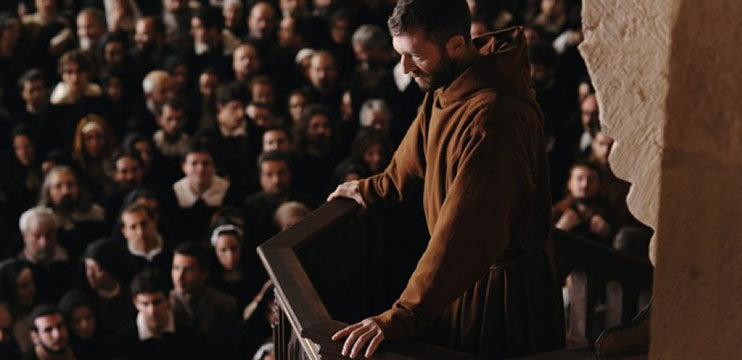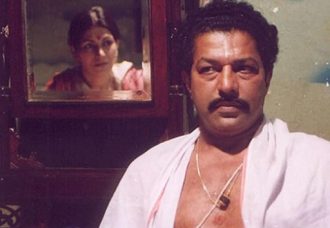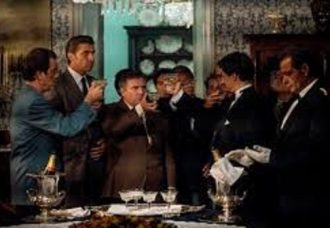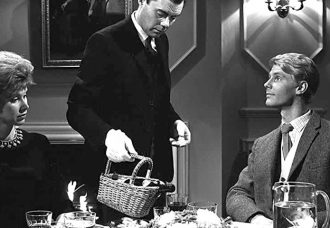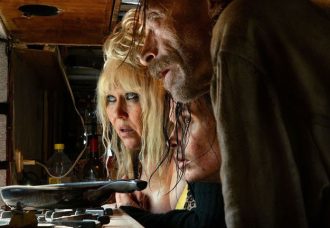The Monk
Dominik Moll has not been prolific, The Monk (2011) being only his fourth feature film. But on the strength of the three films widely seen, there is little doubt that he is one of the most inventive of filmmakers and among the greatest storytellers to have come out of world cinema. Moll is primarily known for two ingenious thrillers – With a Friend like Harry (2000) and Lemming (2005). Both these films take suspense to a new high in as much they have us gripped from start to finish without our guessing till the very end the direction the narrative is likely to take.
Lemming, for instance, begins bafflingly with a young couple discovering that their kitchen drain is clogged. When the husband opens up the drain, he discovers a Lemming (a Scandinavian rodent believed by Malthusians to commit mass suicide). Both these films include the motifs of murder but setting Moll apart from a host of other directors of thrillers is his disinclination to choose a moral standpoint, as it were. In With a Friend like Harry, the villain is a monster capable of cold-blooded murder but his motives are completely altruistic and untainted by even a modicum of self-interest.
The Monk is a more ‘predictable’ film because it is based on an 18th Century Gothic novel by Mathew Gregory Lewis. It has not received too many favorable reviews from critics but it is still a masterpiece of atmospheric storytelling, a medieval ‘thriller’ set at the time of the Inquisition which makes The Name of the Rose – both Umberto Eco’s novel and Jean-Jacques Annaud’s 1986 film – look tacky and pretentious. The problem may be that the film is dealing with notions like the Church and Evil that appear to dictate a moral viewpoint. One must either be for God against the Devil (as in The Exorcist and The Omen) or anti-clerical. But one has only to look at films like The Name of the Rose with its fulminations against the Inquisition to understand how spurious such an approach can be today – when the Church wields little formal power. Bunuel adapted Lewis’ novel into a screenplay and this became the film Le Moine by Adonis Kyrou (1972) starring Franco Nero as the protagonist. Bunuel’s is a different kind of anti-clericalism from The Name of the Rose but Moll is resolutely neutral to the Church and its doctrines, using the framework of medieval Christianity only to locate his narrative.
Moll’s The Monk begins with a prologue in which an unknown man confesses to a priest that he has been in a sexual relationship with his own niece, who should have been like a daughter to him. The confessor is struck by the strangeness of the man going through the motions of confessing not only without repentance but with an almost lurid curiosity in the ranking of sins according to their despicability.
When the actual story begins, a child is abandoned on the front steps of a monastery. The child (pecked at by crows) has a dark birthmark in the shape of a palm on its right shoulder but the Father Superior ignores the warning of a younger monk that this could be the mark of the Devil and decides to bring him up to become a monk. The child grows up to be Ambrosio (Vincent Cassel) who is gifted with uncommon abilities as a preacher. But Ambrosio is also a hard man and, when a nun from a neighboring convent becomes pregnant, rather than show mercy and help her hide her condition, he judges that it would be best for her soul if she suffers punishment and, hence, virtually sends the girl to her death. Ambrosio, already powerful, grows in stature when the Father Superior dies with a warning that he senses the presence of the Devil growing stronger every day in the monastery.
A sub-plot in the story involves the widow Elvira (Catherine Mouchet) and her beautiful and innocent daughter Antonia (Josephine Japy). The two come from a noble family but they have been disinherited by Elvira’s uncle because she married someone much lower placed. Elvira and her late husband were exiled to Caracas where Antonia was born. Elvira confesses to Ambrosio that she suffers from guilt because she had a son named Mateo before Antonia and abandoned him in her anxiety to escape her family’s wrath and the child Mateo was done to death by her uncle. Elvira takes comfort when Ambrosio explains that she has done nothing wrong. A sin is not a sin if it is committed helplessly or to avoid a greater one, he pronounces. Elvira’s daughter Antonia is now courted by Lorenzo, the scion of a noble family but Elvira is afraid that such an unequal match will lead to more grief.
One day, it happens that a boy arrives at the monastery. He wears a mask and the man who brings him there explains that Valerio was badly burnt in a fire and his face is disfigured. He whispers agonizingly that he wants to give his life to God but he would like to remain alone and not share lodgings with the other monks. Overruling the objection of another monk that such seclusion would be against the monastery’s rules – on the grounds that the boy’s suffering would make him ideally suited to life in the Church – Ambrosio accepts the boy. The boy dotes on Ambrosio and also has the magical ability to relieve his benefactor of the terrible headaches that plague him. This goes on, the two coming closer until the boy Valerio confesses that he joined the Church not to come closer to God but to Ambrosio, whereupon he removes his mask to reveal himself to be a young woman. Now aghast, Ambrosio asks Valerio to leave the monastery immediately and Valerio consents, the latter asks for a parting concession – a rose to remember Ambrosio by. When Ambrosio reaches for the flower, he is bitten by a poisonous insect and soon battles for his life – nursed by Valerio, who has now resumed his mask. It is in the course of his treatment that Ambrosio and Valerio have carnal relations, thus beginning Ambrosio’s fall.
The term ‘fall’ has inevitable moral connotations but Moll’s emphasis is not ethical or moral at all. To elaborate through an instance, Ambrosio sins with Valerio after condemning the pregnant nun to death but his act is not ‘hypocritical’ as an anti-clerical film might have had it. He is, rather, gradually taken over by evil – evil not as the antithesis of the moral way but as a metaphysical power outside men. This, it must be emphasized, is no ordinary achievement. The Exorcist and The Omen try to involve the Devil but they also make us fear for those targeted by him. We wish that evil could be thwarted exactly as we wish for the law to prevail in a crime film. Ethics and morality have to do with the freedom to choose but with the Devil actively involved, the question is whether exercising choice is still possible – because evil is now like an affliction. Moll, astutely, sees the degradation of Ambrosio not as a moral transformation which might have been prevented (by choosing to act correctly) but as the taking over of someone by forces which seek to turn him into a beast, reduce his being to yearnings of the flesh. At the climax of the film we suddenly see Ambrosio naked when he has been in the garb of a monk all along and it is as though he had been rendered completely bestial. The distinction between Evil and the morally incorrect is made clearer when Ambrosio’s single truly ‘good’ act happens after he has renounced the Kingdom of Heaven and sold his soul to the Devil. Or rather, his single noble act consists in his sacrificing his soul for someone else’s good.
This description of the film may make it appear to be preoccupied with philosophical issues but The Monk is simply interested in the possibilities of narration and the symmetries that make it pleasurable. Ethics as a philosophical issue may even be dated today because of the moral affirmations constantly made even when the political acts that accompany them are brutally self-serving. The outpourings of The Seventh Seal would be incongruous in a film today when neither religious faith nor the ‘search after meaning’ have much philosophical significance. If Moll tells this story by creating an atmosphere of medieval cruelty stunning in its vividness and power, his greatest triumph, paradoxically, is that he does it so light-heartedly. And in all this he is aided by excellent cinematography (Patrick Blossier), some great art direction (Maria Clara Notari) and a towering performance from Vincent Cassel.
<The above review originally appeared in Bikas Mishra‘s film publication, ‘Dear Cinema’>
The Monk on IMDB




